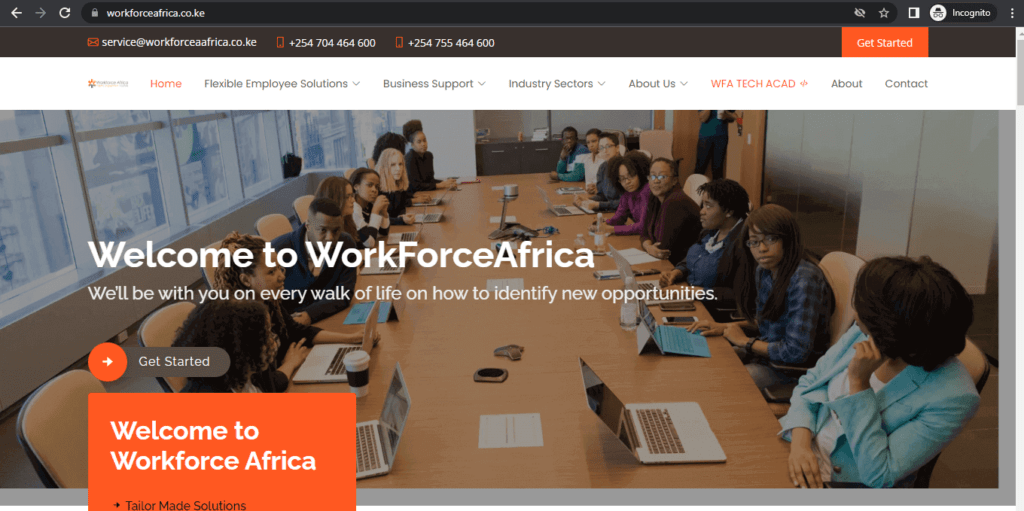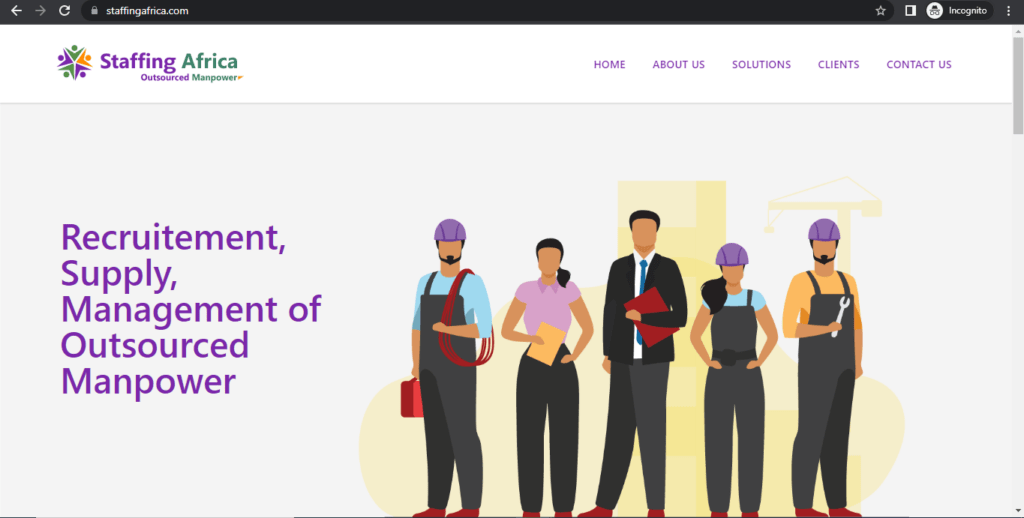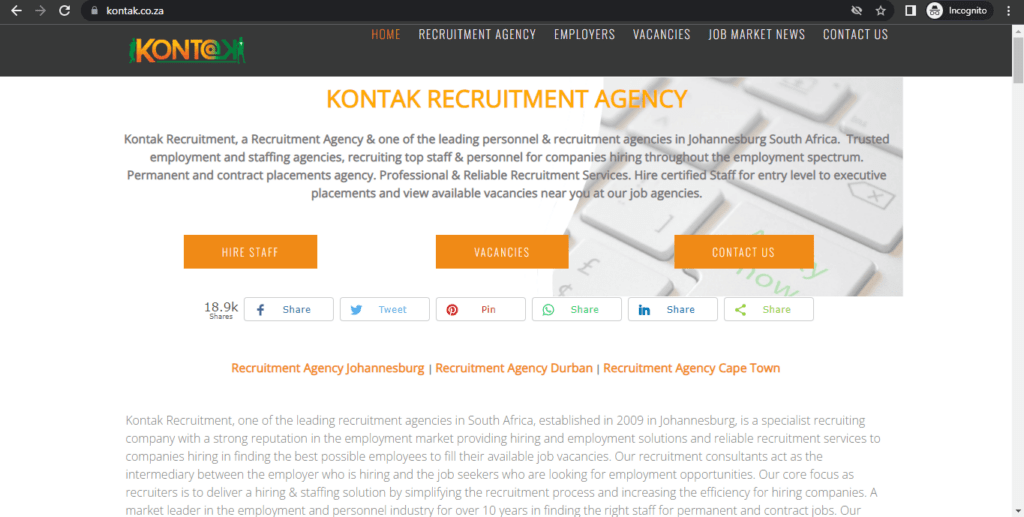When it comes to the offshoring business model, Asia, Latin America, and Eastern Europe have been the long-standing pioneers.
But in the last couple of decades, Africa has been making rapid strides and making its presence felt in the sector. The continent has a lot of things going in its favor and a few that aren’t.
So here’s the big question – should you be offshoring to Africa?
Let’s find out.
In this article, we’ll discuss offshoring to Africa in detail – its benefits and challenges, the four best business-friendly African countries, and the three best staffing solutions.
Let’s get started.
Table of Contents
- 4 key benefits of offshoring to Africa
- 3 challenges you may face when offshoring to Africa
- 4 best countries for offshoring to Africa
- 3 best offshore staffing solutions in Africa
4 key benefits of offshoring to Africa
Whether you set up a captive unit in an African country or partner with a local outsourcing firm to run your business operations, here are some benefits you’re sure to enjoy:
1. Cost-effective operations
The cost of living in African nations is one of the lowest globally. On the worldwide Cost of Living Index, only one African country – Equatorial Guinea – features among the top half (more expensive) of the list of 110 countries.
Developed economies like the United States, the United Kingdom, and Australia are significantly more expensive than African countries like Kenya, Nigeria, and South Africa.
African countries are also less expensive than popular offshoring hubs like Poland, Mexico, and China.
Another vital cost aspect is Africa’s relatively lower average income compared to leading markets globally.
For example, according to Glassdoor, software developers in South Africa earn an average monthly salary of USD 2,239 (based on the exchange rate in April 2022), which is less than half of their American counterparts (USD 8,147).
What this means is that Africa costs less and pays less, making it an ideal offshore outsourcing destination for affordable resources and human capital.
A global organization can afford to spend less in Africa to get the same output as their onshore setup.
2. Access to a young talent pool
Africa has an enormous and largely untapped human resource potential.
According to the World Bank, around 12 million African youth enter the job market each year. By offshoring to African nations, global businesses can harness this large pool of working-age people who are agile and can adapt to the needs of this digital age.
But what makes the prospect of business process offshoring to Africa even more enticing is the age factor.
Today, Africa is the youngest continent in the world, with a median age of about 19 years. For comparison, the median ages in Asia, North America, and Europe are 32, 39, and 42 years, respectively.
The continent’s population is projected to double by 2050, with a median age of 25 years. This gives Africa a massive human capital advantage that has the potential to drive its economic transformation and shape the global economy.
3. An opportunity for impact sourcing
Progressive and socially conscious organizations can create a positive social impact by setting up a team in Africa.
It enables them to hire and provide development opportunities to young Africans, who otherwise have limited career prospects. This opportunity could give the local talent a platform to grow and bring their skills to the global marketplace.
With this kind of exposure, these youths can then help bring about social and economic transformation in their communities and the continent.
This way, African offshoring not only helps companies meet their impact sourcing goals but be a part of the continent’s growth story.
4. Time zone advantages
The time zones in Africa are conveniently positioned for engaging global clients and coordinating business activities in real-time. It also helps ensure round-the-clock production or service delivery.
The time zones in Africa are quite close to those in Europe. For example, Johannesburg is just one hour ahead of London. This enables European firms to have a remote team in Africa that can engage with the on-shore team in real-time.
It also gives Western Europe companies relatively cheaper offshoring alternatives than eastern European countries like Poland, Ukraine, etc.
Similarly, there’s roughly a six-hour time difference between Africa and the USA. So an American company can effectively coordinate with their offshore African team over shared working hours.
There may be some country-specific benefits of African offshoring, including government support, fast internet connectivity, tax incentives, etc.
While African offshoring offers many lucrative benefits, it may also pose some challenges.
3 challenges you may face when offshoring to Africa
Companies should carefully consider some potential issues they may face while offshoring to Africa. It’ll help them analyze its feasibility or take preemptive measures to tackle some of these issues.
So here are four challenges that companies should be aware of:
1. Lack of a job-ready workforce
Although Africa has a massive talent pool, companies may find it challenging to find workers with the necessary skill set for the job.
According to the 2017 edition of the Africa Pulse, a bi-annual report released by the World Bank, businesses find skill shortage a key constraint to their operations.
Similarly, in the 2019 Annual Global CEO Survey by PwC, 87% of African business leaders said that the skill gap was affecting their organizations’ growth prospects.
The Africa Pulse report traces this skill gap to an inadequate formal education system that emphasizes wage employment rather than imparting a value-added skill set.
However, companies that have been successfully operating from Africa recognize the importance of skill development programs for their workforce needs.
The PwC CEO survey reports that 47% of African business leaders rely on domain-specific on-job training, while 16% use lateral hiring to meet their workforce and skill requirements.
Besides, major tech giants such as Microsoft, Amazon, and Google offer dedicated software development and other information technology courses and mentorship programs in Africa. This’ll help bridge this skill gap and further expand the tech talent pool in the continent.
2. Power shortage
The lack of reliable power supply is another primary cause of concern for businesses in Africa, especially in the manufacturing sector.
The International Renewable Energy Agency (IRENA) reports that as many as 30 African countries face regular power shortages because the supply lags behind demand.
This energy shortage problem is more acute in sub Saharan Africa, which comprises major business centers like South Africa, Nigeria, etc.
According to the World Bank, around 78% of firms in sub Saharan Africa are affected by power outages. The annual outages in the region could range from 50 hours to 4,600 hours, that’s up to half of the year.
The insufficient power supply can significantly increase businesses’ operational costs due to the higher overheads for installing an alternative energy source.
However, many progressive energy initiatives aim to resolve Africa’s electricity woes and paint a more optimistic image for the future.
For example, regional agencies like the East African Power Pool (EAPP), South African Power Pool (SAPP), etc., have taken steps to tap into the continent’s vast renewable energy potential and bridge the current gap.
Similarly, initiatives like the Africa Clean Energy Corridor (APEC) and the West Africa Clean Energy Corridor (WACEC) aim to accelerate clean energy production and promote effective distribution among countries.
3. Difficulty securing business capital
Business owners, especially small and medium businesses (SMBs), may face challenges raising capital for their Africa operations.
Bank loans often come with high-interest rates and repaying these loans limits the company’s ability to reinvest. This prevents businesses from scaling and expanding globally.
However, in recent years, fintech solutions have helped companies overcome these challenges. Initiatives like African Continental Free Trade Area (AfCFTA) and The African Growth and Opportunity Act (AGOA) aim to boost investor confidence and help companies get funds at competitive rates.
The African Tech Startups Funding Report states that 564 companies secured record-breaking investments worth USD 2 billion in 2021.
So which African countries should you consider for your offshore operations?
Let’s find out in the next section.
4 best countries for offshoring to Africa
Here are four reliable business havens in Africa that you can consider for your offshore operations:
1. South Africa
South Africa is the third-largest (based on GDP) economy in Africa and a globally favored location for Business Process Outsourcing (BPO) and IT offshoring, according to Statista.com.
The country has twice (2016, 2018) won the ‘Offshoring Destination of the Year’ title, given by the Global Sourcing Association (GSA), London.
The South African BPO services market is valued at USD 461 million and is projected to reach USD 3.6 billion by 2027, growing at a CAGR of 13.2%.
As per CEIC data, the foreign direct investment (FDI) in South Africa recorded an all-time high (USD 38.1 billion) in the third quarter of 2021, indicating a solid investment potential in the country.
Two of the country’s biggest business hubs, Johannesburg and Cape Town, record the largest foreign business footfall in the country. While Cape Town is an established IT and BPO industry destination, Johannesburg is known for its thriving manufacturing sector.
The country has an abundance of talented professionals in diverse sectors, including customer service, manufacturing, IT, telecommunications, and financial services.
Additionally, South Africa also has a strong cultural affinity with the western countries, with English being a commonly spoken language among working professionals. This makes it easier for global businesses to collaborate with their offshore South African team.
2. Nigeria
Nigeria is the biggest economy and the most populous country in Africa. The West African country has a flourishing services sector and has a strong presence in the global offshore outsourcing market, predominantly in the oil and gas sector.
Nigeria is the largest oil and gas producer in sub Saharan Africa and the 13th largest globally. The oil and gas sector accounts for nearly 5.9% of the country’s real GDP and 95% of foreign exchange earnings.
The country has an impressive track record of foreign investments, with many global companies offshoring to Nigeria.
For example, Samsung Heavy Industries (SHI), a leading shipbuilding company from South Korea, has several successful projects running in Nigeria and has raised over one billion USD to develop eco-friendly ship technologies.
It’s a similar story with the ICT (information and communication technology) sector in the country. According to the ‘2021 Africa Global Business Services (GBS) Benchmarking and Market Report’, Nigeria has one of the largest ICT sectors in Africa.
This lays a solid foundation for the growth of the country’s GBS or BPO sector, which is valued at USD 286.8 million (2021) and employs 16,000+ workers.
3. Mauritius
Situated off the South-East coast of the African continent, Mauritius is an island nation known for its stable governance and economic freedom.
Mauritius ranks 30 on the Heritage Foundation’s 2022 Economic Freedom Index, ahead of popular offshoring hubs like Poland, India, and the Philippines.
The country consistently ranks high for democratic and political freedom as well, making it a safe and reliable offshoring destination in Africa.
One of the key reasons companies offshore to Mauritius is the country’s business-friendly tax policies. The country is ranked 15th on the 2021 global Corporate Tax Haven Index.
The 1992 Mauritius Offshore Business Activity Act enables foreign entities to incorporate local subsidiaries with a high level of privacy and negligible taxation.
Besides, the country has signed tax treaties, or Double Tax Avoidance Agreements (DTAA) with 45 nations, which helps companies with international tax planning.
4. Kenya
Kenya is among the fastest-growing African economies and a leading IT services offshoring hub in east Africa.
It’s also a preferred location for offshore services business in domains like content creation, digital marketing, financial services, data management, etc. The services industry accounts for nearly 55% of the country’s GDP.
The key contributors to the country’s growth as an offshoring and outsourcing destination are high internet penetration (highest in Africa at 85.2%), a skilled English speaking workforce, and ease of securing business capital.
The country has laws in place, such as the Central Bank of Kenya Act, to help companies secure business credit quickly and safely.
Similarly, the Nairobi International Financial Centre Act, 2017 aims to develop a robust financial ecosystem and attract foreign investment.
Kenya is also the top-ranking country in Africa and 24th globally on the Financial Secrecy Index by Tax Justice Network.
These policies help the country take a share of the global business process offshoring industry.
The four countries mentioned above have set a high bar for Africa’s offshoring and outsourcing sector. However, the continent is going through an economic transformation and has witnessed a rise in the many alternative options.
There are emerging offshore services hubs like Egypt, Morocco (North Africa), Tanzania, Ghana (Sub Saharan Africa), etc., vying for a share in the regional and global offshore outsourcing market.
Clearly, there are a lot of incentives for global organizations when offshoring to Africa.
But how can you source the best local talent for your African team?
By engaging an expert staffing solution that understands the local job market.
3 best offshore staffing solutions in Africa
Here are three offshore staffing service providers that you consider:
1. Workforce Africa

Workforce Africa is a talent solutions company headquartered in Lagos, Nigeria. Some of the key services that the firm offers include:
- PEO and employer of record services to hire a compliant workforce in any African country.
- Managed business process offshoring solutions that include staff recruitment, facilities management, HR functions, etc.
- Payroll outsourcing service.
2. Staffing Africa

Staffing Africa is a sister company to Manpower Networks Ltd., a leading human resources company based in Nairobi, Kenya.
The firm can help businesses:
- Recruit qualified talent to meet their short-term and long-term requirements.
- Train the staff and manage them through compliant HR solutions.
- Talent mobilization and redeployment services.
3. Kontak Recruitment Agency

Kontak Recruitment Agency is a staffing company headquartered in Johannesburg, South Africa.
The agency offers offshore staffing services, such as:
- Permanent and contract hire for varied domains like IT, BPO (admin and back office jobs), customer support, etc.
- Developing a customized recruitment strategy.
- Screening services like background checks.
Wrapping up
With a massive talent potential and upward economic trend, Africa is poised to be at the center of the global business scene in the coming decades.
However, with low costs of labor and resources, you can reap the financial benefits of African offshoring today.
And in the process, global businesses can also help the continent actualize its tremendous potential.
Use the information shared above to analyze the different aspects of African offshoring and make an informed decision on your offshore destination.

Andy is a technology & marketing leader who has delivered award-winning and world-first experiences.


